
Doug and Larry Michels founded The Santa Cruz Operation, Inc. (SCO)
as a Unix porting and consulting company in 1979. http://www.sco.com/company/history.html
SCO's main offices were in Santa Cruz, California.
SCO produced XENIX, an Intel 8088 port of AT&T Unix System III with some BSD-like enhancements, in 1983.
SCO produced XENIX 286, an Intel 286 port of AT&T Unix System V Release 2, in 1985.
SCO made an agreement with Microsoft to license XENIX in 1987. http://www.tarantella.com/about/history.html
SCO produced XENIX 386, for Intel 386 processors, in 1987.
SCO XENIX 386 supported at most 16 MB of RAM and, due to cpu-based timing loops
in the SCSI driver, systems no faster than a 50 MHz 486.
Unix History http://www.levenez.com/unix/
Caldera http://www.caldera.com bought Unix from SCO http://www.sco.com in 2000.
SCO changed its name to Tarantella http://www.tarantella.com/ but kept rights
to the name SCO.
In mid-2002, Caldera bought name SCO from Tarantella and renamed
itself the SCO Group.
Xinuos http://www.xinuos.com/ bought OpenServer 6 and UnixWare 7. In 2015, Xinuos released OpenServer X based on FreeBSD and also released "Definitive" (final) releases of OpenServer 5, OpenServer 6 and UnixWare 7.
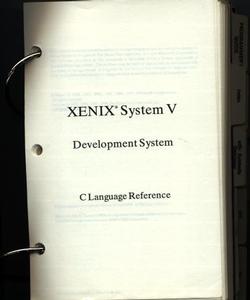
SCO Xenix V Development System C Language Reference, part number
XG-5-1-86-3.0 from 1986. This manual came with the first Xenix 386
development system that we purchased from SCO.
I think that the manual is actually for the 286 version of Xenix.
SCO used to include printed manuals in 3-ring binders in all of their packages,
so we quickly accumulated a lot of manuals.
When we moved to Xenix 386 2.3, I saved a few chapters from
the old SCO binders.
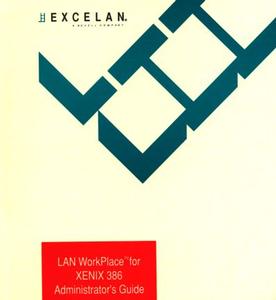
EXCELAN LAN WorkPlace For XENIX 386 Administrator's Guide, from 1989.
Early versions of Xenix 2.2 did not contain tcp/ip.
Under SCO Xenix and SCO Unix, tcp/ip was an extra package that did not
come with the base operating system.
For Xenix 2.2, SCO initially did not even have a tcp/ip package,
so we bought the tcp/ip package from Excelan.
The Excelan socket() interface was based on an old version of BSD,
but it worked OK otherwise.
Since this was the first time that we did network programming,
we had a lot of questions. The support person Radhika Padmanabhan
usually ended up with my calls. Novell eventually bought out Excelan,
I suspect to get control of an Excelan product that allowed Unix systems
to share files with Microsoft networks.
We used SCO tcp/ip on SCO Xenix 2.3 systems and SCO Unix systems.
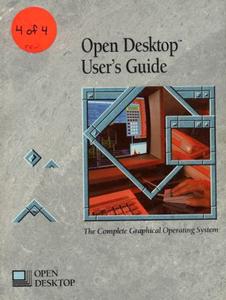
Open Desktop User's Guide The Complete Graphical Operating System,
document version 1.1.0D, document number 104-000-921 40686, from 23 January 1991.
This is a manual for ODT 1.1, a bundle based on SCO Unix System V/386 Release 3.2.2
with ODT-OS (the base Unix V 3.2.2 operating system),
ODT-VIEW (X11 with Motif ported by Locus as SCO XSight combined with the IXI Desktop),
ODT-NET (SCO tcpip, SCO NFS, SCO LAN Manager Client),
ODT-DOS (Locus DOS/Merge that could run MSDOS like an 8086 with 640 KB RAM and
8 MB of EMS-compatible expanded memory), and ODT-DATA (Ingress SQL).
With ODT-DOS, you could run MSDOS programs on Unix command lines,
and you could open an MSDOS box that could access Unix files.
ODT-DOS could even run character-based MSDOS programs over serial terminals
supported by curses.
SCO eventually bought out IXI and resold the IXI Desktop for other operating systems.
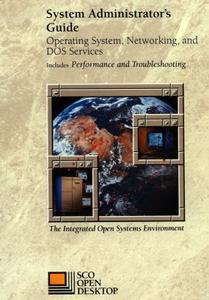
ODT 2.0 System Administrator's Guide Operating System, Networking, and DOS Services
includes Performance and Troubleshooting, document version 2.0.0B,
document number AU10417P000, from 19 June 1992.
ODT 2.0, the next version after ODT 1.1, was based on SCO Unix 3.2v4.0 (actually more
like 4.0-and-a-half because you had to install updates that took the kernel part of
the way to 3.2v4.1) and dropped ODT-DATA. The DOS/Merge package in ODT 2.0 came
with MSDOS 5.00, and you could theoretically purchase Windows 3 and run it in the MSDOS box.
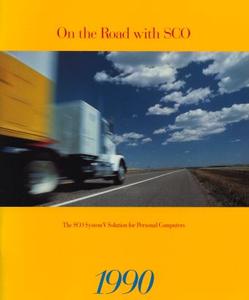
On the Road with SCO The SCO System V Solution for Personal Computers 1990.
This 60-page booklet listed SCO's packages for Xenix 386 and Unix System V.
SCO marketing found a way to sneak in a picture of Las Vegas casinos on
page 23 and of Mötley Crüe on page 35.
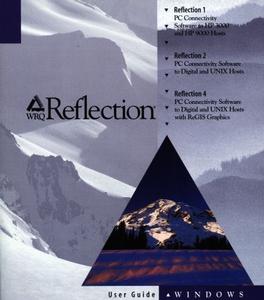
WRQ Reflection Version 5.1 1, 2, and 4 User Guide for Windows,
from December 1995.
Reflection was a terminal emulator.
We used Reflection 4 in vt340 emulation mode to access Unix and VMS systems
through serial and telnet connections.
Reflection 4 supported ReGIS (Remote Graphics Instruction Set),
Tektronix 4010/4014, and sixel graphics.
Reflection 1 connected to HP 3000 and HP 9000 systems,
and Reflection 2 connected to Unix and VMS systems the same
as Reflection 4 but without the support for graphics.
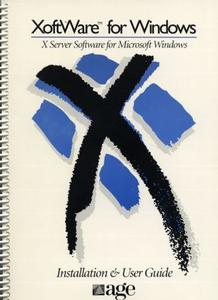
XoftWare for Windows X Server Software for Microsoft Windows
Installation & User Guide, AGE Logic, Inc., Version 1.0 from December 1991.
This was one of the first usable PC X Servers.
We have 5 1/4" disks with XoftWare for DOS serial XFD 1.02 S005288
and XoftWare for Windows serial XFW 1.5 S005543.
They were also the only X Server vendor kind enough to give us
a complementary copy for doing development.
NetManage eventually bought them out.
Apple's MacX was based on NetManage Chameleon/X which was based on
AGE's XoftWare for Macs.
The XoftWare for DOS X Server implement X11R4.
XoftWare for DOS could run on a 286-based DOS PC with EGA, VGA, SVGA, or 8514/A
video cards, and it could use a number of tcp/ip stacks (in the days before
Microsoft included tcp/ip with its operating systems).
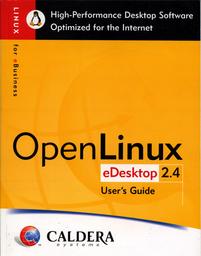
CALDERA Systems OpenLinux eDesktop 2.4 User's Guide: Linux for eBusiness
High-Performance Desktop Software Optimized for the Internet from 2000, part 2CDK01E02401.
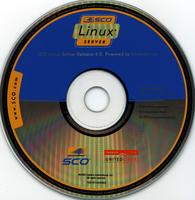
SCO Linux Server Release 4.0, Powered by UnitedLinux,
UnitedLinux Version 1.0, CD 1,
Open-Source sources downloadable from ftp:/ftp.SCO.com/pub/scolinux
from 2002, part 7SRV01A04002.
The writing around the black outer rim reads: RESTRICTED RIGHTS LEGEND: All technical data,
or SCO commercial computer software documentation is subject to provisions of FAR 12.211
"Technical Data," and FAR 12.212-"Computer Software" respectively, or clauses providing SCO
equivalent protection in DFARS or other agency specific regulations. SCO is a registered
trademark of Caldera International, Inc. in the USA and other countries. All names referenced
herein are trademarks of their respective companies.
SCO Xenix
SCO Xenix (for Apple Lisa, PDP-11, etc.) based on AT&T System III SCO Xenix 386 based on AT&T System V Release 2.2 xenix 2.2.0 -> xenix 2.2.1 -> xenix 2.2.2 -> xenix 2.2.3 based on AT&T System V Release 2.3 xenix 2.3.0 -> xenix 2.3.1 -> xenix 2.3.2 -> xenix 2.3.3 -> xenix 2.3.4 AT&T UNIX System V Release 2 based: 198? SCO Xenix ?.? [Xenix for the IBM XT] 1986 SCO Xenix 2.1.1 [Xenix for the 80286] 1987 SCO Xenix 2.1.3 [Update "A" to the os] 1988 SCO Xenix 2.2.1 1988 SCO Xenix 2.2.3 1989 SCO Xenix 2.3.1 [last 16 bit release] 1989 SCO Xenix 2.3.1 GT [32 bit for 80386; SCSI support] 1989 SCO Xenix 2.3.2 1990 SCO Xenix 2.3.3 1991 SCO Xenix 2.3.4 [the release that was never going to happen!]
SCO Unix
based on AT&T System V Release 3.2.2
unix 3.2.2/odt 1.0 -> unix 3.2v4.0/odt 2.0 -> unix 3.2v4.1 ->
unix 3.2v4.2/odt 3.0/open server 3.0 ->
unix 3.2v5.0.0/open server 5.0.0 -> 5.0.1 -> 5.0.2 -> 5.0.3 -> 5.0.4 -> 5.0.5 -> 5.0.6 -> 5.0.7 ->
open server 6.0
AT&T UNIX System V Release 3 based:
1989 3.2.0 [No X, no TCP/IP]
1990 3.2.0 ODT 1.0 [First ODT release with X and TCP/IP]
1991 3.2.1 ODT 1.1 [Ingress bundled]
1992 3.2v2 ODT 2.0 Phoenix
[There was no 3.2v3 - the next was named 3.2v4 coincident but != SysV R4]
1994 3.2v4.0 ODT 3.0 Tbird
3.2v4.1 ODT 3.0
1995 3.2v4.2 ODT 3.0 | OSR 3.0
1996 3.2v5.0 OSR 5.0.0 Everest
1996 3.2v5.0.1 OSR5.0.1 never released
1997 3.2v5.0.2 OSR5.0.2 Tenzing / FRDE [European internationalized]
1997 3.2v5.0.2 OSR5.0.2 IFS Internet Fast Start
1998 3.2v5.0.4 OSR5.0.4 Comet
rs504c Capitola (Release Supplement 504c)
Boulder Creek and Aptos (other 504 release supplements)
1999 3.2v5.0.5 OSR5.0.5 Davenport
rs505a Encinal
2000 3.2v5.0.6 Freedom
rs506a Gilroy
2002 3.2v5.0.7 Harvey West
2009 3.2v5.0.7V OSR5.0.7V (with pre-installed VM)
Release 5 based:
2005 SVR5 OpenServer 6.0 Legend (merge of UnixWare 7 and OpenServer 5)
FreeBSD based:
2015 FreeBSD 10 OpenServer 10 (FreeBSD 10 and Xinuos enhancements)
SCO UnixWare
based on AT&T System V Release 4.2
unixware 1.x
based on AT&T System V Release 4.2MP
unixware 2.x
Different SCO version based on the same AT&T release are usually incremental fixes and updates are available as (usually free) SLS's (support level supplements). Applying the fixes usually does not require getting new versions of third party device drivers.
Notes about different versions:
xenix 2.2.x
first version of xenix available for a 386
last version of xenix available for a 286
xenix 2.3.x
can run SCO Unix 3.2 COFF binaries
supports streams
xenix 2.3.3
never actually released as a shrink wrapped product, you must apply an SLS
from 2.3.2 to get here
fixes bugs with select and pipes needed to run XSight (SCO's X package) or
VP/ix (SCO's dos-under-unix package)
xenix 2.3.4
final release of xenix
kernel changes that break device drivers for earlier 2.3 versions
unix 3.2.2
supports AFS (Acer file system)
odt 1.1
bundle with unix 3.2.2 and x11
unix 3.2v4.0
support for EAFS (Extended Acer file system)
support for long file names
support for symbolic links
optional tcpip networking package
odt 2.0
bundle with unix 3.2v4.0 + kernel patches + tcpip + x11r4 + Motif 1.1
ose 3.0
bundle with unix 3.2v4.2 + tcpip + x11r5
unix 3.2v5.0.0, v5.0.2, v5.0.4, v5.0.5, v5.0.6, v5.0.7
support for ELF executables and dynamically linked shared objects
unified memory for processes and io buffers
journaling filesystem, faster than EAFS and does not need long fsck runs
tcpip + x11r5 + Motif 1.2.5 included
openserver 6.0
file support up to 1 TB
multi-processor support increased to 32 processors
memory support up to 64 GB
SVR5 kernel from UnixWare 7.1.4
backwards compatibility with XENIX 386, SCO OpenServer 5, SCO UNIX, SCO Open Desktop and UnixWare
unixware 2
relabeled Novell UnixWare
unixware 7
unixware 2 kernel plus parts of 3.2v5 (unixware 2 + openserver 5 = unixware 7?)
The UDK (UnixWare and OpenServer Development Kit) allows you
to create a single binary that will run under UnixWare 7,
OpenServer 5.0.*, and UnixWare 2.1.*.
open unix 8
enhanced unixware 7 with a linux kernel personality to run Linux binaries.
openserver X / openserver 10
Support for 64 bit hardware and for both Intel and AMD.
Based on FreeBSD.
SCO Unix and Open Server tuning tips scotuning.html.
Upgrade options:
From SCO Xenix or SCO Unix, it is easy to upgrade to SCO OpenServer.
SCO Unix and OpenServer can run most SCO Xenix binaries.
SCO OpenServer and SCO UnixWare 7 can run most SCO Unix and SCO OpenServer binaries.
SCO used to have a free OpenServer CD for evaluation and for non-commercial use
available at http://stage.caldera.com/offers/license.html
that you could use to test if your SCO Xenix or SCO Unix binaries will work.
If your SCO Unix binaries use COFF static shared libraries (usually installed in /shlib),
you might need to copy the libraries to OpenServer.
Linux has an iBCS2 kernel module http://www.purplet.demon.co.uk/linux/ibcs/
and http://linux-abi.sourceforge.net/
that allows it to run most SCO Xenix OMF binaries, SCO Unix and SCO OpenServer COFF binaries,
and SCO OpenServer ELF binaries. Linux and iBCS2 can even run SCO Xenix binaries produced
by Oregon Pascal-2 that do not run under SCO Unix or SCO OpenServer.
Linux can mount Xenix file systems. I heard once that someone upgraded a Xenix
system by replacing the Xenix kernel with a Linux kernel but leaving all of the
Xenix binaries and scripts in place.
In general, most SCO Xenix and SCO Unix binaries will run under both SCO OpenServer and under Linux as long as they do not depend on the kernel's memory layout (for example, programs like top, u386mon, and monitor) and do not make tricky ioctl calls (for example, programs like kermit and bash).
SCO UnixWare can run Linux binaries http://uw713doc.caldera.com/en/LX_uw/CONTENTS.html
I have some open source SCO Xenix, Unix, and OpenServer programs available for downloading at ftp://ftp.newspapersystems.com/pub/binaries/
The best location for finding SCO binaries is Caldera's Skunkware site at http://www.caldera.com/skunkware/
Jean-Pierre Radley's SCO ftp site ftp://ftp.jpr.com
Armory.Com SCO ftp site ftp://ftp.armory.com/
Xenix FAQ http://www.uni-giessen.de/faq/archiv/sco-xenix/msg00000.html
Xenix FAQ http://www.unicom.com/pw/faq/sco-xenix.faq
SCO version information http://members.cruzio.com/~jeffl/sco/versions.txt
More SCO information from Jeff http://members.cruzio.com/~jeffl/
A.P. Lawrence's SCO and Unix site http://aplawrence.com/
Xenix Programmers' Manual http://www.tenox.tc/docs/microsoft_xenix_programmers_manual.pdf
Xenix software museum http://dyne.org/museum/software/xenix/
SCO Skunkware ftp://ftp.zenez.com/pub/SCO/
Lynx text browser for Xenix ftp://ftp.zenez.com/pub/SCO/Skunk96/src/Tools/lynx-2.5FM/ReadMe.html
Screen capture of Xenix boot http://www.cybertechhelp.com/forums/showthread.php?p=1039108
Pictures of BC at SCO Forum 2002 http://tw.caldera.com/images/partners/geoforum/p1010016.jpg and SCO Forum 2003 http://www.sco.com/2003forum/snapimages/p8180019_jpg.jpg
SCO vs. Linux
SCO has their claim to the unix source at http://www.sco.com/scosource/
and the unix history at http://www.sco.com/scosource/unixtree/unixhistory01.html
Another view of the claim http://www.arie.org/doh/
OSI Position Paper on the SCO-vs.-IBM Complaint by
Eric Raymond (President of the Open Source Initiative) http://www.opensource.org/sco-vs-ibm.html
OSI unix history tree http://www.opensource.org/timeline.png
History of Tarantella, Inc. http://www.tarantella.com/about/history.html
A Novell statement from May 2003 that it still
owns the unix copyright http://www.novell.com/news/press/archive/2003/05/pr03033.html
A LinuxWorld article from July 2003 http://www.linuxworld.com/story/33809.htm
An InfoWorld editorial from July 2003 http://www.infoworld.com/article/03/07/03/26OPcurve_1.html
SCOvsIBM Wiki http://twiki.iwethey.org/twiki/bin/view/Main/SCOvsIBM
SCO vs. IBM by Lawrence Rosen, OSI General Counsel, Aug 2003 http://www.osdl.org/docs/qa_re_sco_vs_ibm_html.html
Analysis of SCO Forum Aug 2003 Slide Show http://www.perens.com/Articles/SCO/SCOSlideShow.html
Analysis of SCO's evidence by Greg Lehey, Aug 2003 http://www.lemis.com/grog/SCO/code-comparison.html
SCO's Evidence: This Smoking Gun Fizzles Out by Eric Raymond, Aug 2003 http://www.catb.org/~esr/writings/smoking-fizzle.html
GrokLaw Blog http://www.groklaw.net/
GrokLine Unix timeline project http://www.grokline.net/
Analysis of SCO cases at TuxRocks http://sco.tuxrocks.com/
IBM Catalogs SCO's Failure, by ColonelZen, Oct 2006 http://www.ip-wars.net/story/2006/10/14/233634/06
IBM Speaks, At Last, Oct 2006 http://www.groklaw.net/article.php?story=20061021132243916
USL vs. BSDI documents from 1992-1993
posted by Dennis Ritchie http://cm.bell-labs.com/cm/cs/who/dmr/bsdi/bsdisuit.htm
Someone who tried to pay SCO http://perlguy.net/sco.html
A converted SCO mug http://www.bmgen.com/sco_mug/
SCO vs. God http://sco.lunaticsworld.com/
SCO Is Undeniably and Reliably Dead, Feb 29, 2016 http://fossforce.com/2016/02/sco-is-undeniably-and-reliably-dead/
Return to the museum ../museum.html
http://williambader.com -
Revised March 21, 2023 11:58:02 PM.
Copyright © 2023 William Bader.